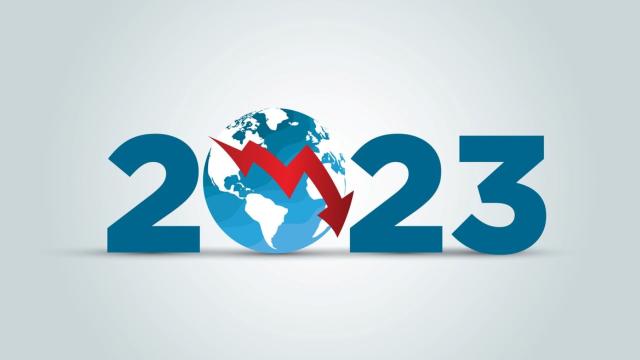Why Recession 2023 Could Spark a Revolution in Corporate World
The ongoing economic downturn, also known as Recession 2023, is causing a seismic shift in corporate values, as companies begin to prioritize purpose over profi
- by B2B Desk 2023-04-24 12:03:11
The ongoing recession 2023, is bringing corporate responsibility to the forefront of public discourse. As millions of people struggle to make ends meet, there is a growing sense that companies must take accountability for their actions and give back to the communities they serve. This has led to a renewed focus on ethical and sustainable practices, from environmental initiatives to fair labor practices, as corporations face increased scrutiny from consumers and stakeholders alike. By prioritizing the needs of their stakeholders, businesses can build stronger, more resilient communities that can weather the storm of recession 2023. As the pressure mounts for companies to act and demonstrate their commitment to social responsibility, a revolution in the corporate world may be on the horizon.
The ongoing economic downturn, also known as Recession 2023, is causing a seismic shift in corporate values, as companies begin to prioritize purpose over profit. As businesses struggle to stay afloat, they are being forced to re-evaluate their priorities and consider how they can make a positive impact on society. This has led to a growing trend towards purpose-driven strategies that prioritize the well-being of employees, customers, and society at large, rather than just the bottom line. By embracing a more holistic approach to business, companies can build stronger, more sustainable relationships with their stakeholders, and contribute to a more equitable and just world. With consumers and stakeholders demanding greater transparency and accountability, the pressure is on for businesses to demonstrate their commitment to social responsibility, and to make meaningful contributions to the world around them. The result is a fundamental shift in corporate values, as businesses move away from a profit-driven approach and towards a purpose-driven one, with the goal of creating a more sustainable and equitable future for all.
While it is true that many companies have been forced to implement layoffs as a result of the recession, it is important to note that a purpose-driven approach to business also includes a commitment to treating employees with dignity and respect. In some cases, companies may have to make difficult decisions in order to stay afloat, but they can still prioritize the well-being of their employees by offering support, resources, and opportunities for retraining or upskilling. Additionally, purpose-driven companies may focus on creating a more inclusive and equitable workplace culture that values diversity and promotes employee well-being. Ultimately, the goal is to strike a balance between financial sustainability and social responsibility, and to create a business model that benefits all stakeholders, including employees, customers, and society at large.
Recession 2023 has the potential to be a turning point in the corporate world as businesses are forced to confront the vulnerabilities and inequities of the current system. Companies that can adapt and innovate will emerge stronger, but they must also be willing to embrace a new normal that prioritizes social responsibility, sustainability, and inclusivity. The crisis has highlighted the importance of flexibility, resilience, and adaptability, and companies that can pivot quickly and make the necessary changes will be better positioned to succeed in the long term. The new normal could catalyze lasting change in the corporate world, as businesses rethink their priorities, reassess their values, and create more sustainable and equitable business models. The pandemic has shown us that we cannot continue with business as usual and that a more sustainable and equitable future requires a fundamental shift in the way we do business. Companies that embrace purpose-driven strategies, prioritize employee and community well-being, and contribute to a more just and equitable society will be better positioned to succeed in the new normal.
Here are some potential lasting changes that could result from the recession of 2023:
- Greater emphasis on social responsibility and sustainability
- Increased adoption of remote work and flexible work arrangements
- More equitable compensation and benefits packages for employees
- Greater investment in employee training and development
- Increased focus on diversity, equity, and inclusion in the workplace
- Emphasis on employee well-being and mental health support
- More robust and flexible supply chain management practices
- Greater investment in digital transformation and innovation
- Shift towards purpose-driven business models
- Increased collaboration and partnerships between businesses and communities
- Greater transparency and accountability in corporate decision-making
- Adoption of new technologies and automation to increase efficiency and productivity
Recession 2023 presents a unique opportunity for businesses to rethink their priorities, values, and strategies. The crisis has highlighted the vulnerabilities and inequities of the current system and has forced companies to adapt and innovate in order to survive. However, it has also created an opportunity for businesses to create lasting change in the corporate world by prioritizing social responsibility, sustainability, and inclusivity. By embracing purpose-driven strategies, investing in employee well-being and development, and creating more sustainable and equitable business models, companies can emerge stronger and better positioned to succeed in the long term. The lasting changes that could result from this crisis have the potential to create a more just, equitable, and sustainable future for all.
Also Read: Recession will hit one-third of global economy
POPULAR POSTS
List of 5 Top clothing brands in India: You must know
by B2B Desk, 2024-06-06 08:59:58
5 Unusual Economic Indicators to Predict Slumps in Economy
by B2B Desk, 2023-04-24 12:43:35
5 Lesser Known Facts About The World Richest Man 2023
by B2B Desk, 2023-04-21 12:10:36
Top 10 FMCG Companies in India in 2023
by B2B Desk, 2023-03-17 10:50:25
Top 10 Successful Business Ideas for Women in 2023
by B2B Desk, 2023-03-13 09:07:00
Top 10 Largest Malls in India in 2023
by B2B Desk, 2023-02-22 07:34:11
Top 10 Richest Cricketer in the world in 2023 with their net worth
by B2B Desk, 2023-02-08 11:11:39
RECENTLY PUBLISHED

Loan EMIs to Drop as RBI Slashes Repo Rate - Full MPC December 2025 Highlights
- by Shan, 2025-12-05 11:49:44

Pine Labs IPO 2025: Listing Date, Grey Market Premium, and Expert Outlook
- by Shan, 2025-11-05 09:57:07

The Agentic Revolution: Why Salesforce Is Betting Its Future on AI Agents
- by Shan, 2025-11-05 10:29:23

Top 10 Insurance Companies in India 2026: Life, Health, and General Insurance Leaders Explained
- by Shan, 2025-10-30 10:06:42

OpenAI Offers ChatGPT Go Free in India: What’s Behind This Big AI Giveaway?
- by Shan, 2025-10-28 12:19:11

Best Silver Investment Platforms for 2025: From CFDs to Digital Vaults Explained
- by Shan, 2025-10-23 12:22:46





 Subscribe now
Subscribe now 